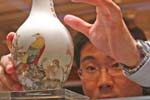Society
'200m in danger of workplace disease'
Updated: 2011-04-12 07:15
By Chen Xin (China Daily)
BEIJING - Occupational disease has overtaken workplace accidents as the biggest danger to Chinese workers with 200 million potentially under threat, a senior trade union official warned.
Tang Chun, an occupational disease expert with the labor protection department under the All-China Federation of Trade Unions, estimated that around 200 million workers in some 16 million enterprises work in hazardous environments.
| ||||
A total of 722,730 cases were reported from 1949 to 2009, and 146,500 lives had been lost to occupational disease, he said.
About 90 percent of the cases were related to pneumoconiosis, or black lung disease, caused by inhalation of dust, especially mineral or metallic.
"New cases of the incurable lung disease outnumber deaths caused by workplace accidents, which number about 6,000 annually," Tang said.

Yu Wenlan, a health expert with the Chinese Center for Disease Control and Prevention, told China Daily that only 10 percent of employees in China receive regular occupational health services.
The Law on Prevention and Control of Occupational Diseases clearly stipulates that employers should provide free health checkups for laborers who work in hazardous conditions and inform them of the results.
"But a majority of small- and medium-sized private enterprises, which account for almost 90 percent of the country's corporate units, fail to provide such services," Tang said.
"The number of cases revealed would have been shocking if the service had been available for all laborers in those enterprises."
Migrant workers account for a large number of cases as they work in the most hazardous industries, especially mining, processing of construction materials and electronic manufacturing, he said.
Poor workplace sanitation and safety procedures are usually to blame, he added.
The majority of China's 230 million migrant workers do not have stable employment and regularly change jobs, a situation that employers can easily take advantage of by offering short-term employment often without contracts, Tang said.
As an example, Tang cited a visit to a smelter in Qingxu, in North China's Shanxi province. More than 10 furnaces were in operation and hundreds of men worked in an environment so full of dust that it was impossible to see more than a meter ahead.
With a surplus labor force, many workers are grateful for any job regardless of how hazardous it is and have, at best, a rudimentary knowledge of their rights, he said. Lax supervision by work safety watchdogs is also to blame.
Tang suggested that local governments should make regular spot checks of working conditions to monitor the input of work safety bureaus and encourage enterprises to improve conditions.
Amending the occupational diseases law, which dates back to 2001, is part of this year's agenda of the top legislative body, he said.
E-paper

Green light
F1 sponsors expect lucrative returns from Shanghai pit stop
Buying into the romance
Born to fly
Light of hope
Specials

Share your China stories!
Foreign readers are invited to share your China stories.

No more Mr. Bad Guy
Italian actor plans to smash ‘foreign devil’ myth and become the first white kungfu star made in China.

Art auctions
China accounted for 33% of global fine art sales.




